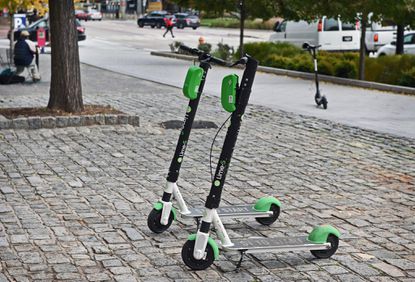Additional Reporting by Stefan Joyce
As of Oct. 4, the use of electric scooters on campus has been prohibited per an email from Loyola’s Environmental Health and Safety Department (EHS), which cited concerns that the scooters threatened the community’s overall safety.
“The safety and well-being of the Loyola community are a top priority,” said Director of EHS, Tom Hettleman. “Our campuses must be safe, easily navigable places for members of our community.”
According to Donelda Cook, Vice President for Student Development, Loyola began communicating with electric scooter companies as early as last spring. Since then, Loyola has been in agreement with these companies to ensure that they are not dropping off scooters on campus. With students bringing scooters on campus from elsewhere, though, both Cook and Hettleman recognized the mobility issues arising.
“We’re really concerned about the safety. We’re a small campus, and it’s easily walkable,” said Hettleman. Between scooters blocking doorways and riders using them in dangerous places like the bridge, scooters were causing a threat to both the rider and anyone around them.
A handful of significant incidents between last semester and this semester led to the campus-wide email from Hettleman.
“We support sustainability and what Baltimore City’s doing with trying to have easier transportation for people, but on the campus here, it’s just not the right place to have the scooters whipping in and out,” said Hettleman.
Riding in Baltimore is not a problem, according to Cook and Hettleman. Rather, issues arise out of unreasonable riding on Loyola’s campus.
The prohibition of electric scooters is being used more as a means to manage scooter usage and safety rather than as a punitive measure. Although Cook and Hettleman are hopeful that students will continue to adhere to the rules, their aim is not to “police” scooters.
“It really is an issue of just trying to manage the judgment that some people don’t have on their own,” said Cook.
According to Hettleman, the amount of positive student feedback is relatively even with the amount of negative feedback. While some students have expressed being put at a disadvantage without the convenience of an electric scooter, others are happy to see more safety measures being taken on campus.
“I was kind of surprised because usually, you’ll get a lot more people complain than you will people who said, ‘thanks for doing it,’” said Hettleman.
Since the ban, scooter-related incidents on campus seem to have simmered, according to Hettleman. EHS has not received further complaints regarding any incidents since the email was released. This new ruling is in place for the long term; according to Cook, if something changed about the circumstances, the prohibition may be altered along with them. However, without that occurrence, the ban is fairly permanent.
In response to students citing transportation issues without the scooters and having a harder time getting to class, Hettleman mentioned the reality of getting to places in a timely manner before electric scooters were popular.
“Students didn’t have a problem getting on campus before we had the scooters,” said Hettleman. “I sympathize with them [students] and I understand if they want to ride a scooter all the way around [the perimeter of campus]. That’s fine, but cutting through campus and stuff is an issue.”
In alignment with EHS’ objective of maintaining a safe campus environment, electric scooter use, according to Cook and Hettleman, will continue to be managed and the Loyola community will be expected to use their judgment when it comes to scooter usage.
For more information, contact Environmental Health and Safety at ehs@loyola.edu.
Image Courtesy of The Baltimore Sun


















































































































